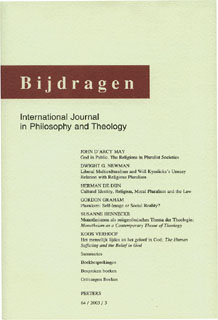 previous article in this issue previous article in this issue | next article in this issue  |

|
Document Details : Title: Spinoza's Politics Subtitle: Between Tradition and Utopia Author(s): BIJLSMA, Rudmer Journal: Bijdragen Volume: 72 Issue: 2 Date: 2011 Pages: 161-182 DOI: 10.2143/BIJ.72.2.2131108 Abstract : This paper deals with the relation between politics and ethics in Spinoza’s philosophy. The first question that I address, is what Spinoza’s notion of political freedom entails. Is political freedom just a condition of peace and security for the collective, or does it also entail the moral freedom of the Ethics? The former interpretation seems plausible, since Spinoza’s politics is chiefly concerned with peace and security. Yet certain passages of the political works echo the moral ideal of the Ethics, namely that of a free life through an adequate understanding of Nature and our place in it. I therefore argue that Spinoza’s political notions of reason and freedom are ultimately to be identified with their moral counterparts. They cannot be wholly reduced to (the seeking of) peace. This interpretation immediately leads to a second problem - how can Spinoza combine his professed realism in politics with his moral perfectionism? It seems that collective moral freedom must be illusory to someone who claims to describe humans as they are, not as they ought to be. Through a detailed analysis of Spinoza’s view of the development of political freedom, I argue that this is in fact a coherent view. First, I show how living in a Spinozist state may stimulate a basic rational disposition in people. Then I turn to Spinoza’s view of rational development in the Ethics, and argue that he is in that work very aware of the limits that our finite existence puts on the moral ideal. This brings me to the suggestion that, if this ideal is to have any practical relevance, it must not be wholly separated from the sphere of the imagination. If we accept this, then the narratives that bring harmony to a collective - consisting of both imaginative and rational elements – may also be considered as (potential) sources of moral freedom. This prevents Spinoza’s politics from being utopian, since it roots his quest for collective freedom firmly in tradition. |
